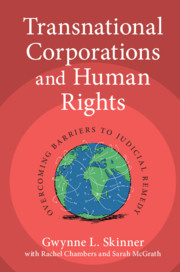Book contents
- Transnational Corporations and Human Rights
- Transnational Corporations and Human Rights
- Copyright page
- Dedication
- Dedication
- Contents
- Foreword
- Abbreviations
- Table of Cases
- Table of Statutes
- Introduction
- Part I Rise of Transnational Corporations, Impact on Human Rights, And Victims’ Rights to Remedy
- Part II Legal Barriers to Remedy and How to Overcome Them
- Conclusion
- Select Bibliography
- Index
Introduction
Published online by Cambridge University Press: 04 September 2020
- Transnational Corporations and Human Rights
- Transnational Corporations and Human Rights
- Copyright page
- Dedication
- Dedication
- Contents
- Foreword
- Abbreviations
- Table of Cases
- Table of Statutes
- Introduction
- Part I Rise of Transnational Corporations, Impact on Human Rights, And Victims’ Rights to Remedy
- Part II Legal Barriers to Remedy and How to Overcome Them
- Conclusion
- Select Bibliography
- Index
Summary
The number of transnational corporations (TNCs) – including parent companies and subsidiaries – has exploded over the last forty years. In 1970, there were approximately 7,000 TNCs in the world; today, there are more than 100,000 with over 900,000 foreign affiliates.1 TNCs are now so complex and amorphous in their structure – even compared to ten years ago – that it is difficult for even the most sophisticated legal systems to adequately hold TNCs accountable for the harms they create in countries where they operate, even as the TNCs make enormous profits at the expense of often vulnerable communities. The truth is, certain legal doctrines, often devised nearly a century ago or longer, are too outdated to sufficiently assure that TNCs are held accountable for harms they create in today’s world, where TNCs operate globally, and often have structures that transcend a single country or jurisdiction.
- Type
- Chapter
- Information
- Transnational Corporations and Human RightsOvercoming Barriers to Judicial Remedy, pp. 1 - 6Publisher: Cambridge University PressPrint publication year: 2020



